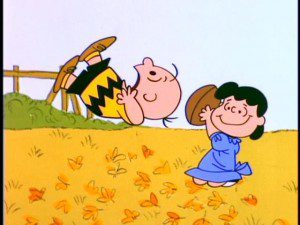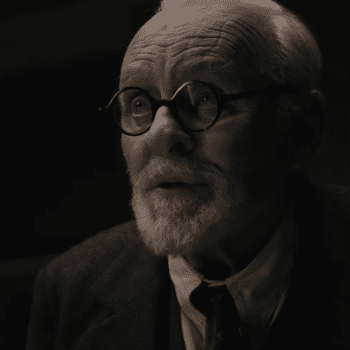The new trailer for The Peanuts Movie came out a couple of days ago. And while trailers can be misleading, this feels promising. It looks like Charlie Brown, Snoopy and company are getting a fresh, 3-D coat of paint while still holding true to creator Charles M. Schulz’s original vision.
But if that’s true, we should feel a bit fatalistic about Charlie Brown’s determination to rebrand himself.
“I’m going to change who I am and become a winner!” Charlie Brown says in the trailer. It’s ironic, really: If Charlie Brown becomes a winner, he’ll cease to be Charlie Brown.
It’s not that Charlie Brown never wins. He does, but it is ever-so rare. The cartoonist said once that Charlie Brown loses so often because, in a way, he has to. He’s got to suffer “because he is a caricature of the average person. Most of us are much more acquainted with losing than winning.” For Schulz, it’s part of what it meant to be human. We suffer. And in truth, that suffering is a big reason why we lose faith, or keep it.
Schulz was a devout Christian for much of his life, and his faith often snuck into his strips. According to Dennis Hoover’s Religion in the News story “Peanuts for Christ,” as many as 10 percent of them had something to do with religion. Through Peanuts, Schulz quoted the Bible, made spiritual allusions and, most famously, had Linus tell the Christmas story in A Charlie Brown Christmas. In 1965, Presbyterian minister Robert L. Short published The Gospel According to Peanuts. It sold more than 10 million copies.
But for Schulz, faith was not a cure-all, feel-good panacea. It was a deeply mysterious thing, and I think his sense of faith helped create both Peanuts’ obvious heart and sometimes startling darkness. The world of Peanuts was a fallen one where trees eat kites and footballs are yanked and the Red Baron always gets away. As lovable as Schulz’s characters were, they weren’t winners. “People say Peanuts explored religion in our lives,” Tim Burke of the Philadelphia Inquirer once wrote. “Sure, if your definition of religion begins and ends with the book of Job.”
“Life is difficult, isn’t it, Charlie Brown?” Linus asks him one day.
“Yes, it is,” Charlie Brown says. “But I’ve developed a new philosophy. I only dread one day at a time.”
“Cartooning is preaching,” Schultz is quoted in Charles M. Schulz: Conversations. “And I think we have a right to do some preaching. I hate shallow humor. I hate shallow religious humor, I hate shallow sports humor, I hate shallowness of any kind.”
 While Peanuts was simple, it was never shallow. For all its spiritual ruminations, Schulz never suggested there were easy answers or pat formulas for living or even happy endings. Charlie Brown suffered mightily under Schulz’s pen.
While Peanuts was simple, it was never shallow. For all its spiritual ruminations, Schulz never suggested there were easy answers or pat formulas for living or even happy endings. Charlie Brown suffered mightily under Schulz’s pen.
And yet for all of that, our enduring image of Charlie Brown is of him standing—still standing—wearing his yellow zig-zag shirt and his crooked smile. Life is hard, he seems to tell us. We all lose. But there’s still a lot of joy to be found in playing the game. In hanging out with our crazy dog. In living.
We follow Charlie Brown’s example. Sure, the fallen world may yank away our football. It may crush our pitch and send us spinning. But hey, that’s life, right? It involves its share of lumps. So we pick ourselves off the pitching mound, dust ourselves off and keep moving on, finding reasons to smile from time to time.
The world is fallen. Schulz knew that. We know it. We shouldn’t place our hope in it, but we should take what joys it offers when we can.
In one Sunday strip, Charlie Brown drags himself over to Lucy’s psychiatry stand in a serious funk.
“What can you do when you don’t fit in?” he asks. “What can you do when life seems to be passing you by?”
“Follow me,” Lucy says. “I want to show you something.
“See the horizon over there? See how big this world is? See how much room there is for everybody? Have you ever seen any other worlds?”
“No,” Charlie Brown says.
“As far as you know this is the only world there is … right?”
“Right.”
“You were born to live in this world … right?”
“Right.”
“Well, LIVE IN IT, THEN!” Lucy hollers. “Five cents, please.”













